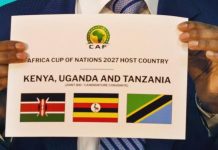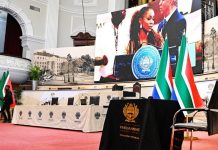Africa-Press – South-Africa. Collectively, we can all #BreakTheBias, and this starts with unconditionally celebrating women’s achievements, raising awareness against bias, and taking concrete actions for equality for all, writes University of Limpopo’s Professor
Omphemetse Sibanda.
The South African Chapter of the International Association of Women Judges (SAC-IAWJ) will be hosting its annual Conference from 5-7 August 2022 at the University of South Africa.
The conference, under the theme, “Empowerment as a tool to fight gender-based violence # Breaking Barriers and Bias”, is organised in partnership with the University of South Africa and the Department of Women, Youth and People with Disability.
It is both saddening that this conference takes place when women in South Africa are being assaulted every second. The hosting of the event could not have come at a better time on many fronts. For example, August is Women’s Month, which on Monday, 1 August 2022, was officially launched by the South African Government at the Olive Conference Centre in Durban, KwaZulu-Natal. But, most importantly, that the pandemic of gender-based violence (GBV), in particular against women and children, is getting worse and more gruesome yearly.
The latest despicable act of GBV is the horrific Krugersdorp gang rapes of women by a heartless bunch of men. Though it may not be sound and easy to achieve from a human rights approach point of view, it is still understandable when there is a call for administering hormonal drugs to reduce sexual violence recidivism or chemical castration as it is commonly known. In the US and other countries, for example, chemical castration has been incorporated as a statutory punishment to deal with paedophiles.
Women under constant attack
One hopes the esteemed participants at the SAC-IAWJ conference do reflect on the yearly national Women’s Month celebration and how these celebrations are changing the lives of women in South Africa, who are under constant attack. Also, that they will reflect intensely on the latest reported incidents of GBV and how, in their decision-making as judges, they can empower the fight against GBV.
The future of protection of women against GBV and other forms of discrimination also lies in the work of the SAC-IAWJ, which is currently led by the designated Deputy Chief Justice Mandisa Maya as its president. To borrow from the UN Office on Drugs and Crime’s Gender Equality Strategy 2018 – 2021, one hopes that the SAC-IAWJ “will guide our efforts to improve the representation of women at all levels in order to reach gender parity and to promote gender equality and the empowerment of women in work across our mandates [as a country]”. (Own emphasis)
So that readers are well-informed, the South African Chapter “was formed in August 2004 and formally inaugurated by the then South African President Thabo Mbeki at a ceremony on 8 August 2004.” The chapter aims to achieve an inclusive judiciary among others. The South African Chapter embraces what its mother body the International Association of Women Judges (IAWJ) subscribes to, namely: “To promote and empower women judges who can help uproot gender bias, end discriminatory laws, advance gender-responsive courts, and promote human rights for all.”
Interesting is the Chapter’s acknowledgement that judicial officers – men and women – “are in a uniquely privileged position to influence the lives of vulnerable and disadvantaged people: and that collectively its members “ensure equal justice for all everywhere”.
The role of women judges, magistrates, lawyers, prosecutors, and other female judicial officers in the fight for equity, equality and the fight against GBV is invaluable. During the inaugural International Day of Women Judges on 10 March 2021, the United Nations crisply observed that “gender equality and the empowerment of all women and girls … is crucial to achieve progress across all the Sustainable Development Goals and to add a gender perspective to the implementation of the 2030 Agenda. Specifically, the representation of women in the judiciary is significant for many reasons. In addition to ensuring that the legal system is developed with all of society in mind, it also inspires the next generation of female judges and motivates them to achieve their goals”.
Justice Maya and her members in the SAC-IAWJ, given a proper space to influence women’s protection and empowerment measures, have the unmatched potential to positively change the plight of women – not only from the point of equal representation on the Bench, but also with regard to the eradication of the scourge of GBV and women access to justice.
It is an organisation, such as the SAC-IAWJ, that can help change the reality, perceptions and opinions that GBV victims are constantly failed by the system. The International Court of Justice is one of the institutions that are particularly concerned that discriminatory practices and bias against women continue to undermine criminal investigations and prosecutions in GBV cases, but this sordid picture can still be changed. Admittedly, there have been cases in South Africa where our courts missed golden opportunities to make a difference in the lives of women, and advance women empowerment whilst at the same time breaking the cycle of violence and bias against women.
De-educating men
With this opinion, I should not necessarily be seen to be insinuating that women judges pursue a legal career with the intention of fighting discrimination against women. Across the globe, distinguished women judges have had a lifelong interest in gender equality and protection of women against GBV and other forms of micro-aggressions. It was once noted by the late Chief Justice of the US Supreme Court, Ruth Bader Ginsburg, that a woman pursuing a legal career on the ticket of fighting discrimination against women was a non-starter and career limiting. It is critical that the SAC-IAWJ approach to embracing empowerment as a tool to fight GBV and break the biases and inequality.
Much still needs to be done, including de-educating men that nobody is safe and free until women are free from harassment, degrading treatment, and any form of violence. Also, to uproot deeply entrenched patriarchal mindsets and beliefs about the roles and responsibilities of women and men in society prevalent, including within the judiciary. Empowerment initiatives or discourses, such as those planned by SAC-IAWJ, must also take into account gender sensitisation – for the South African society to understand that gender sensitisation is not a battle between the sexes nor an anti-male campaign.
However, efforts to empower women, and break barriers and biases against women, must never be blunted by arguments that both women and men can experience GBV and other challenges. If anything, South African men, from a gender sensitisation perspective, must take a personal reflection on why patriarchal beliefs, gender stereotyping, myths and views about male superiority are sustainable and perpetuated.
Collectively, we can all #BreakTheBias, and this starts with unconditionally celebrating women’s achievements, raising awareness against bias, and taking concrete actions for equality for all.
The inhumane treatment of women must be brought to an abrupt end. Women and children of South Africa are no less deserving of constitutional rights and protection by all sectors of the society and government functionaries, otherwise, we probably have not seen the last of the barbaric Krugersdorp gang rape and similar incidents.
My hope for breaking the bias, women empowerment and protection lie in the work of lady justices who are part of the SAC-IAWJ.
– Professor Dr Omphemetse S Sibanda, Legal Scholar Without Borders, is a Professor of Law and the Executive Dean of the Faculty of Management and Law at the University of Limpopo.
For More News And Analysis About South-Africa Follow Africa-Press






